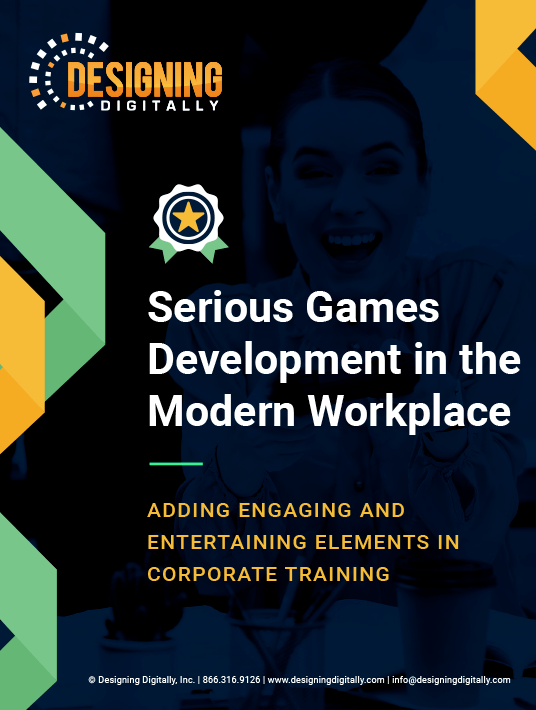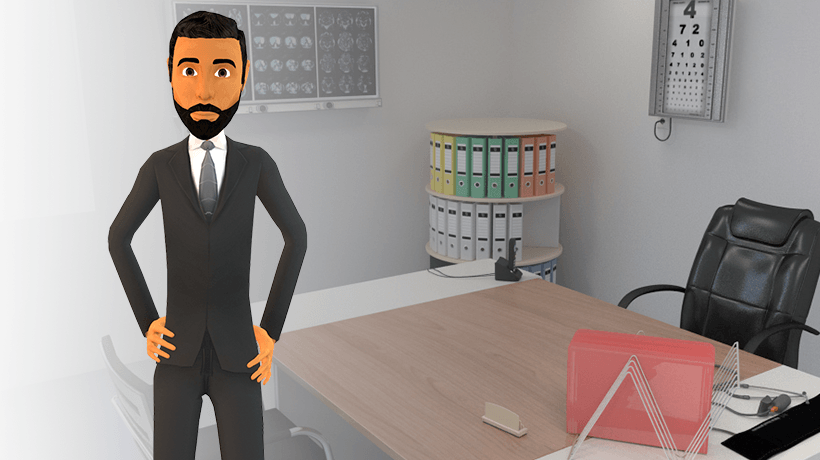Choosing The Right Vendor For Serious Games Development
Game-based learning, through serious games and gamification, is consistently finding its way into corporate Learning and Development strategies. This method of corporate training is proving to be quite effective. Serious games, in particular, are taking center stage, being adopted for their gameplay appeal. The mix between educational and fun factors makes these training games highly engaging and motivating to employees.

A well designed serious game attracts the player with its beautiful visuals, enjoyable gaming experience, and valuable learning elements. It is meant to be entertaining as well as to provide key concepts in an easy to grasp way. The game can contain as many levels as needed for successfully covering the learning material. It can include incentives in the form of badges, leaderboards, and other rewards types. If you want to go all out, you can have your game design team add the option of personalized learning paths. This will allow high customization capabilities based on each employee's skill and knowledge level.
Ultimately, the role of a serious game is to increase employee productivity and job satisfaction.
Begin With These 2 Steps
If you're planning to develop a serious game for your employees, you'll need to first pin down two important components: an analysis and a plan.
1. Analysis
First, you'll need to conduct an in-house investigation. This sounds rather serious but we're not talking about a police investigation. It is fundamental that you survey your employees to figure out what type of game would best fit in with their preferences and capabilities. This will allow you to gauge employee skill and knowledge levels also, which will help when developing the content for your game.
Second, do a quick search to see if an off-the-shelf game might fit your needs. It is less likely that you'll find a game perfectly tailored to your business goals and employee learning objectives, but you never know! This bit of research will also help you gain insight into what serious games are out there. You'll learn about how they can be implemented and the results other companies experienced from training games.
2. A Plan
If you decide that a custom serious game is your best option, then start setting up a solid training and implementation strategy. Implementation depends a lot on what your employee training strategy needs to be. So, think about these questions when fleshing out your plan:
- When do you want to release the game for your employees?
- Do you know the game components yet?
- How often do you want these components to be updated?
- What platform or application will you use?
- How will you evaluate the game's success?
- What should your implementation plan look like?
9 Tips For Finding A Serious Game Development Vendor
Now let's get down to the real subject of this article: finding a serious games development vendor. Of course, you can build your game in-house, if you so desire. But, this comes with obvious pitfalls:
- Your design team might not have the know-how for developing a serious game.
- You might be lacking the proper resources for game implementation.
- Time constraints might cause the development to lag.
- Priorities for other projects might disrupt development flow.
- You might come up against challenges or obstacles that you won't be sure how to handle.
A game design team needs to combine the skills of quite a few people. Generally, a serious game development vendor can provide the right team size and skillset to meet your specific demands. The basic crew in charge of your game might include one or two programmers, a graphic designer, an instructional designer, a content writer, and several quality assurance testers.
Depending on the type of serious game you are looking to create, you might also need an illustrator, animator, voice actor, or scriptwriter. Communicating your strategy and implementation plan, and giving clear directives to your chosen vendor, will make the whole process run smoother. So, without further ado, here are the 9 qualities your game development vendor should ideally have:
1. An Impressive Background And Proven Competence
This is where quality over quantity will matter most. You'll want to choose a game developer that can present top-quality finished project examples. Ask them about their rate of success with each, what the challenges were, and what solution they brought to the table. You'll also want to do a web search to see what online presence the vendor has. A blog with valuable information, a good social media status, and reader engagement are all signs of high competence level.
2. Core Resources
Resources can come in the form of people or technical property. You can ask your chosen vendor to introduce you to the team that will be in charge of your project. They might even supply you with detailed information on their staff, past projects they have worked on, or other significant data. Make sure to also inquire about more technical game development capabilities. The development platform, software, and testing procedures must be able to handle your game's complexity.
3. A Portfolio Of Case Studies
A self-respecting game design company will definitely have a portfolio to show off. Look over the case studies carefully and check for similarities with your own project. You'll get a good idea of whether this vendor can deliver the quality of the game you need.
4. A Trustworthy Development Process
Ask your vendor about what software licensing they retain, how they obtain their images and videos and make sure they have a solid anti-plagiarism system in place. The seriousness with which they respond to your request will reveal whether they can be trustworthy or not. This is one of those minuscule details that can tell a whole story about the vendor you're vetting.
5. The Ability To Build A Scalable Game
Make sure the game development company you favor can accommodate a scalable serious game. This means that the game wireframe and infrastructure must allow for changes to be made in the future. Do not skip this step as it is very important to be able to modify the game according to the results of the first test-run.
6. A Good Quality Assurance Team
You'll want your vendor to have a vigorous quality assurance team. Ask about this team's process, how they handle errors or bugs they uncover, and to what level of detail they go to assure the game turns out the way you need it to.
7. Communicate Efficiently And Give Feedback Often
The vendor's style of communication will be evident in the first few meetings. You'll want a team manager who doesn't oversell, seems confident, and doesn't sugarcoat what possible issues might arise. Basically, you want someone who will tell you straight up what they can and cannot do.
When it comes to receiving and asking for feedback, you can't know beforehand how this process will go. Pay attention to what other people are saying about the company and make it clear to the vendor that frequent feedback is an important element for you and your company.
8. Verifiable Client Testimonials
Lots of sites have testimonials. This is a common practice for businesses to gain credibility with their prospective customers. Unfortunately, they're not always truthful. To avoid a possible scam, ask the vendor for a couple of contact points for past clients that you might reach out to.
9. Clear Fee Charging Approach
One clear indicator of an honest and confident vendor is price transparency. Make sure the quotes you receive are consistent throughout and that the vendor always checks with you before making decisions that might influence the final price for the game design.
Conclusion
A great serious game development vendor will undoubtedly display many more qualities that we haven't touched upon in this article. Still, keeping these 9 basic tips in mind will help you distinguish the best from the worst. Read the eBook Serious Games Development In The Modern Workplace and learn more about the benefits that are gained with game-based learning.








